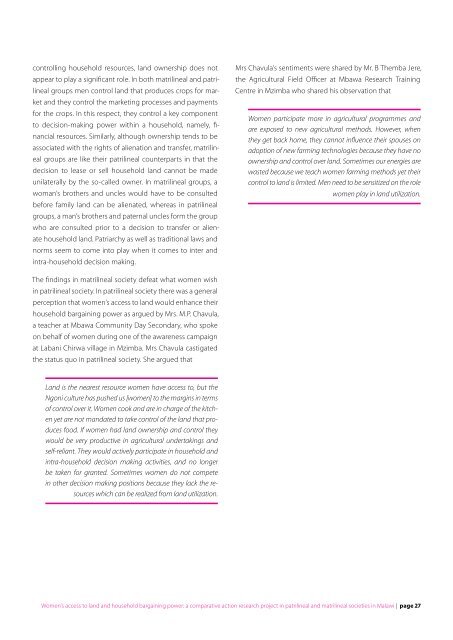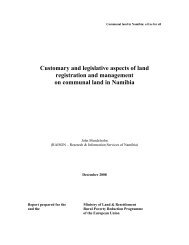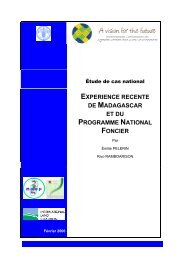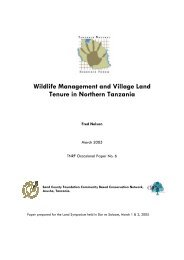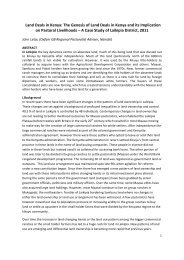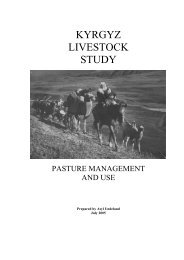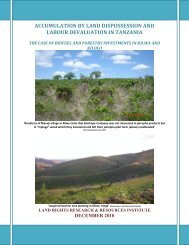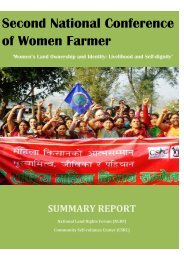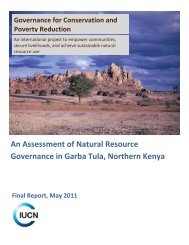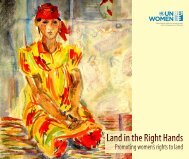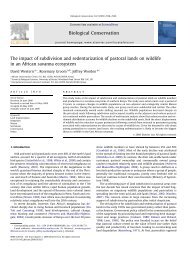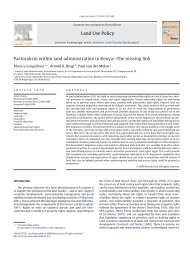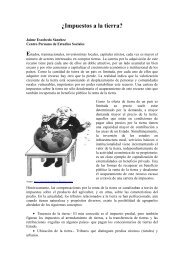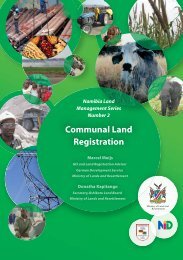Women's access to land and household bargaining power
Women's access to land and household bargaining power
Women's access to land and household bargaining power
You also want an ePaper? Increase the reach of your titles
YUMPU automatically turns print PDFs into web optimized ePapers that Google loves.
controlling <strong>household</strong> resources, <strong>l<strong>and</strong></strong> ownership does not<br />
appear <strong>to</strong> play a significant role. In both matrilineal <strong>and</strong> patri-<br />
lineal groups men control <strong>l<strong>and</strong></strong> that produces crops for mar-<br />
ket <strong>and</strong> they control the marketing processes <strong>and</strong> payments<br />
for the crops. In this respect, they control a key component<br />
<strong>to</strong> decision-making <strong>power</strong> within a <strong>household</strong>, namely, fi-<br />
nancial resources. Similarly, although ownership tends <strong>to</strong> be<br />
associated with the rights of alienation <strong>and</strong> transfer, matrilin-<br />
eal groups are like their patrilineal counterparts in that the<br />
decision <strong>to</strong> lease or sell <strong>household</strong> <strong>l<strong>and</strong></strong> cannot be made<br />
unilaterally by the so-called owner. In matrilineal groups, a<br />
woman’s brothers <strong>and</strong> uncles would have <strong>to</strong> be consulted<br />
before family <strong>l<strong>and</strong></strong> can be alienated, whereas in patrilineal<br />
groups, a man’s brothers <strong>and</strong> paternal uncles form the group<br />
who are consulted prior <strong>to</strong> a decision <strong>to</strong> transfer or alien-<br />
ate <strong>household</strong> <strong>l<strong>and</strong></strong>. Patriarchy as well as traditional laws <strong>and</strong><br />
norms seem <strong>to</strong> come in<strong>to</strong> play when it comes <strong>to</strong> inter <strong>and</strong><br />
intra-<strong>household</strong> decision making.<br />
The findings in matrilineal society defeat what women wish<br />
in patrilineal society. In patrilineal society there was a general<br />
perception that women’s <strong>access</strong> <strong>to</strong> <strong>l<strong>and</strong></strong> would enhance their<br />
<strong>household</strong> <strong>bargaining</strong> <strong>power</strong> as argued by Mrs. M.P. Chavula,<br />
a teacher at Mbawa Community Day Secondary, who spoke<br />
on behalf of women during one of the awareness campaign<br />
at Labani Chirwa village in Mzimba. Mrs Chavula castigated<br />
the status quo in patrilineal society. She argued that<br />
L<strong>and</strong> is the nearest resource women have <strong>access</strong> <strong>to</strong>, but the<br />
Ngoni culture has pushed us [women] <strong>to</strong> the margins in terms<br />
of control over it. Women cook <strong>and</strong> are in charge of the kitchen<br />
yet are not m<strong>and</strong>ated <strong>to</strong> take control of the <strong>l<strong>and</strong></strong> that produces<br />
food. If women had <strong>l<strong>and</strong></strong> ownership <strong>and</strong> control they<br />
would be very productive in agricultural undertakings <strong>and</strong><br />
self-reliant. They would actively participate in <strong>household</strong> <strong>and</strong><br />
intra-<strong>household</strong> decision making activities, <strong>and</strong> no longer<br />
be taken for granted. Sometimes women do not compete<br />
in other decision making positions because they lack the resources<br />
which can be realized from <strong>l<strong>and</strong></strong> utilization.<br />
Mrs Chavula’s sentiments were shared by Mr. B Themba Jere,<br />
the Agricultural Field Officer at Mbawa Research Training<br />
Centre in Mzimba who shared his observation that<br />
Women participate more in agricultural programmes <strong>and</strong><br />
are exposed <strong>to</strong> new agricultural methods. However, when<br />
they get back home, they cannot influence their spouses on<br />
adoption of new farming technologies because they have no<br />
ownership <strong>and</strong> control over <strong>l<strong>and</strong></strong>. Sometimes our energies are<br />
wasted because we teach women farming methods yet their<br />
control <strong>to</strong> <strong>l<strong>and</strong></strong> is limited. Men need <strong>to</strong> be sensitized on the role<br />
women play in <strong>l<strong>and</strong></strong> utilization.<br />
Women’s <strong>access</strong> <strong>to</strong> <strong>l<strong>and</strong></strong> <strong>and</strong> <strong>household</strong> <strong>bargaining</strong> <strong>power</strong>: a comparative action research project in patrilineal <strong>and</strong> matrilineal societies in Malawi | page 27


